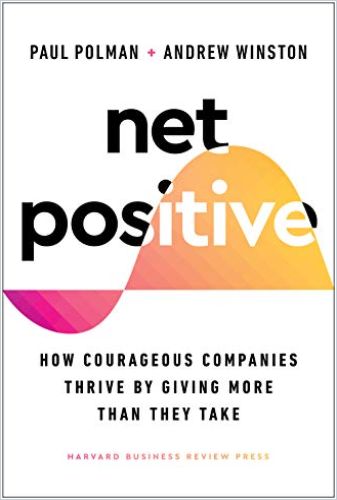Former Unilever CEO Paul Polman and sustainability expert Andrew Winston issue a clarion call for businesses to embrace a new model, one that does good.

A Force for Good
Note to companies seeking to thrive in today’s tumultuous environment: “Not bad” is no longer good enough. Instead of setting goals that minimize harm, former Unilever CEO Paul Polman and sustainability expert Andrew Winston call on corporate leaders to pursue “net positive” results – to make each company a force for good. From forming partnerships across sectors to changing worldviews, Polman and Winston offer a detailed blueprint to guide you in building thriving enterprises while making the world a better place. You can apply their actionable insights to make your organization net positive.
All Stakeholders
Rather than putting only your shareholders first and focusing on short-term gains, a net positive company serves all stakeholders, gives more than it takes, operates within natural and moral boundaries, and improves everyone’s well-being.
Given its outsized role in society and in creating the mess we’re in, business has a fundamental responsibility to help clean it up.Paul Polman and Andrew Winston
The business community helped create a problematic economic system focused on unlimited growth, exacerbating inequity. Now, the authors say, businesses should take the lead on bring about a fundamental change: creating public benefit rather than just avoiding harm.
Eliminating Harm
Leaders, insist Polman and Winston, must recognize that eliminating harm offers opportunities to innovate, save money and build partnerships.
This knowledge enables leaders to create value not only for their employees and shareholders, but also for their communities, countries, future generations and the planet. They should understand that fossil fuel use, plastic waste and food insecurity are multidimensional problems that demand multi-partner solutions.
Purpose, Humanity, Humility
The world of business believes that life is a competition, and capitalism requires unfettered markets.In reality, nature thrives on collaboration.
Bringing your values to work and living your purpose will make you feel alive, and you’ll bring out the best in everyone around you.Paul Polman and Andrew Winston
Net positive leaders operate from a position of duty, purpose and service. They recognize humanity’s needs and build partnerships to meet them.They care for future generations.
Purpose
Identify your purpose and configure your business to motivate your employees, attract customers and build trust with stakeholders.Create a vision that earns buy-in from your board of directors and employees.
Polman and Winston remind readers to target their purpose, not only their fiscal goals, and to think big. Align your key performance indicators with your mission and environmental, social and governance goals.
Outside-In
“Inside-out” thinking puts products first. Instead, operate outside-in by recognizing the context in which you operate and create your products or services.
If a goal is not making you uncomfortable, it’s not aggressive enough.Paul Polman and Andrew Winston
Set courageous, uncomfortable, results-oriented and aspirational goals. Use interim goals to boost confidence and momentum.
Inspire those in your supply chain, both downstream and upstream, to embrace net positivity. Generate a net positive impact on the world inside your company and outside of it.
Trust and Transparency
Gaining trust takes time, and you can lose it in a heartbeat.
Build trust by being genuine in your desire to help and being honest about the benefits to your business.Paul Polman and Andrew Winston
To build trust, be open and transparent, put your community’s needs ahead of your own, be honest with your critics and do the right thing.
Partners
You need partnerships to solve large-scale environmental and social issues. Consider partnerships that seek change within the system and those that seek to change the system itself by uniting with the private sector, governments and civil society partners.
Net positive companies work actively with peers to change industry norms, reduce combined impacts, and greatly improve outcomes and the sector’s image.Paul Polman and Andrew Winston
Establishing partnerships inside your value chain also helps your suppliers become net positive. Taking action for everyone’s mutual benefit deepens your relationships with civil society – educational institutions, nonprofits, philanthropies and nongovernmental organizations.
Additional partnerships with multi-stakeholder groups – peer companies, customers, suppliers, NGOs, governments, academics and finance – offer bountiful benefits.
Tough Issues
Pay your fair share of taxes and create an honor code, a code of conduct and basic principles. Stop overpaying executives and create more equitable pay structures.Move spending from stock buybacks to research and development. Diversify your board members and address human rights and labor issues. Embracing diversity will have a positive effect on your suppliers, policymakers, hiring officers, managers and board members. It supports innovation and improves your bottom line.
Principles
Culture is the action and atmosphere that emanates from your company’s core beliefs. Building a net positive culture means being diverse, encouraging empathy and purpose, and rewarding positive behavior.
If values are core beliefs, and purpose is your ‘why,’ then culture is how you show it.Paul Polman and Andrew Winston
Your organization’s culture must challenge norms and stand on principle against societal wrongs. Polman and Winston urge you to use your culture as a seedbed for changing your community and the world.
Systemic Change
The authors believe leaders must rethink consumption and growth and find new definitions of success, such as using metrics that include environmental and social targets.
Profit should come not from creating the world’s problems, but from solving them. Paul Polman and Andrew Winston
Leaders must uphold basic human rights, provide jobs and living wages, and redefine their organizational fiduciary duties to embrace responsibility for the impact of their environmental, societal and governance decisions. In other words, according to Polman and Winston, corporations must take responsibility for creating a brighter future.
A New Work
Many business writers have been adding their voices to the growing chorus calling for a net positive approach to business. But few have Paul Polman’s experience as a CEO and his credibility. Knowing that he spent his life amid the hard realities of corporate life makes Polman’s call for a completely new business world all the most persuasive. Andrew Winston captures Polman’s humane ideas and together they offer calm, rational – never polemical – strategies and underlying reasons why corporations must take the lead in addressing the ills of today and tomorrow.
Andrew Winston also wrote The Big Pivot: Radically Practical Strategies for a Hotter, Scarcer and More Open World and, with Daniel C. Etsy, Green To Gold: How Smart Companies Use Environmental Strategy to Innovate, Create Value, and Build Competitive Advantage. Other noteworthy books on responsible corporate action include Green Swans: The Coming Boom in Regenerative Capitalism by John Elkington; Frugal Innovator: Creating Change on a Shoestring Budget by Navi Radjou and Jaideep Prabhu; and Legacy: The Sustainaable Development Goals in Action by Masami Sato and other authors.









